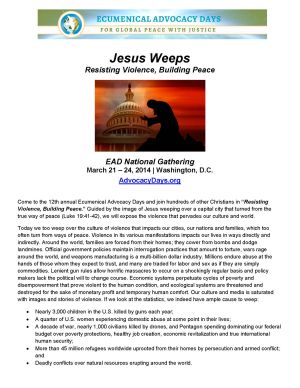Jesus Weeps – Resisting Violence, Building Peace
Friday, March 21 – Monday, March 24, 2014
Doubletree Hotel, Crystal City, Virginia | Washington, D.C.
Theme Background
Today we too weep over the culture of violence that impacts our cities, our nations and families, which too often turn from ways of peace. Violence in its various manifestations impacts our lives in direct and indirect ways. Around the world, families are forced from their homes; they cower from bombs and dodge landmines. Official government policies maintain interrogation practices that amount to torture, wars rage around the world, and weapons manufacturing is a multi-billion dollar industry. Millions endure abuse at the hands of those whom they expect to trust, and many are traded for labor and sex as if they are simply commodities. Lenient gun rules allow horrific massacres to occur on a shockingly regular basis and policy makers lack the political will to change course. Economic systems perpetuate cycles of poverty and disempowerment that prove violent to the human condition, and ecological systems are threatened and destroyed for the sake of monetary profit and temporary human comfort. Our culture and media is saturated with images and stories of violence. If we look at the statistics, we indeed have ample cause to weep:
- Nearly 3,000 children in the U.S. killed by guns each year;
- A quarter of U.S. women experiencing domestic abuse at some point in their lives;
- A decade of war, nearly 1,000 civilians killed by drones, and Pentagon spending dominating our federal budget over poverty protections, healthy job creation, economic revitalization and true international human security;
- More than 45 million refugees worldwide uprooted from their homes by persecution and armed conflict; and
- Deadly conflicts over natural resources erupting around the world.
Despite the many examples of violence in our world, as people of hope we are consoled by the promise that “justice and peace shall embrace” (Psalm 85:10). This embrace is demonstration that without peace justice is illusory and without justice peace is deceptive. This image is the embodiment of God’s vision for our world- God’s shalom. Shalom is often translated as “peace,” but its Hebrew roots imply a deeper meaning of peace that goes beyond cessation of violence toward a holistic vision of true security, healing, and restoration involving all areas of social and economic life. It is this vision of “peace with justice,” or “Just Peace” which many of our religious traditions have embraced and continue to strive toward.
The image of an “embrace” in the Psalm also reminds us that our hope is not passive, but active. As people of faith we are called to join with God in this active work and are reminded that justice requires peace-making and that peace requires justice-making. Many of our congregations already work for justice by serving those in need, embracing the stranger, advocating for equality and just economic systems. Others are active in peacemaking efforts and conflict transformation, challenging the violence of domestic abuse and gun violence, reforming the unjust prison system, or working for U.S. foreign policy that will aid peace in Africa, Asia, the Middle East, or Latin America. All of these efforts are needed and together we must explore the relationship between working for justice and building peace. Throughout the conference, the relationship between justice and peace will be explored in four areas:
- Peace in the Community– So that all may live free from fear (Micah 4:4)
- Peace with the Earth – So that life is sustained
- Peace in the Marketplace– So that all may live with dignity
- Peace among the Peoples – So that human lives are protected*
Through prayer, worship, speakers, workshops and advocacy training we will discover a faith-based vision for national policies that will “guide our feet into the path of peace” (Luke 1:79). This “Path of Peace,” much like the life of John the Baptist referenced in the context of this passage, will require us to embrace a path not only of personal transformation, repentance, and forgiveness – but a vision for how these principles can take root in the social and political realities of our world. Like John, we are called to preach (through words and action) that vision of repentance, and prepare the way for God’s reign of justice and true peace to enter our world. As the Body of Christ today, we will take these messages of love, repentance, and hope with us as we go to Capitol Hill on Monday’s Lobby Day to call for change in public policy and together lift up a holistic vision of a more just and peaceful world.
Download a printable copy of the 2014 EAD National Gathering theme backgrounder.
*This formulation is from the World Council of Churches’ “Ecumenical Call to Just Peace” issued prior to its International Ecumenical Peace Convocation in 2011.


